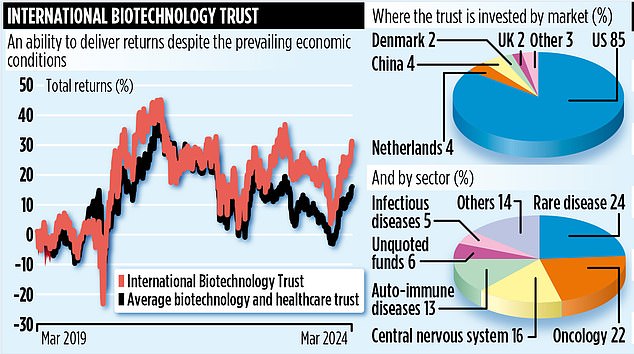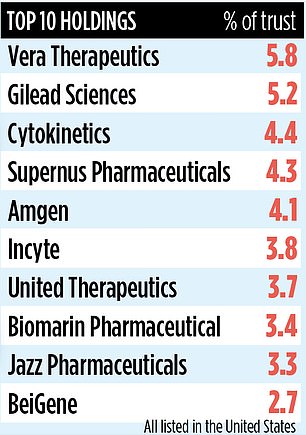The managers of investment trust International Biotechnology will celebrate their third anniversary on Friday at the helm of this £262 million stock market-listed fund.
Although it has been a challenging time, Ailsa Craig and Marek Poszepczynski are optimistic the bear market in biotech stocks that has played out under their watch – triggered by a mix of company over-valuations and higher interest rates – is now over.
‘Company valuations are looking attractive again,’ says Craig. ‘The biotech sector is in a sweet spot. New companies are coming to the market and merger and acquisition activity is picking up.’
The turnaround is reflected in the short-term performance numbers. Over the past three months, the trust has registered positive returns of 11 per cent, compared with a small loss over the past three years of 0.7 per cent. Longer term, the fund has recorded ten-year returns of 169 per cent.
The fund, 30 years old in May, is the country’s oldest biotech investment trust. Over the past year, its management has transferred from SV Health Investors to Schroders because of SV’s decision to focus on venture capital funds.

‘Key shareholders were keen to keep the management team and the investment mandate the same,’ says Craig. ‘It’s why Marek and I have remained in situ.’
She believes Schroders’ clout in investment trusts – it runs 12 other funds besides International Biotechnology – will help grow the fund. It also complements the company’s two existing healthcare trusts – Schroders Capital Private Equity Healthcare and Schroders Healthcare Innovation.
‘It’s a positive move on so many levels,’ explains Craig. ‘International Biotechnology is a nice slot- in, sitting between a fund investing in early-stage businesses and one that holds the healthcare companies which tend to buy the kind of stocks we invest in.’
The trust currently has 70 equity holdings, with most listed in the US. Some are familiar names such as Gilead Sciences, a company which was at the forefront of developing antiviral medicines to combat Covid during the 2020 pandemic. It is also a leader in HIV treatment.
‘Gilead is a well-established company,’ says Poszepczynski. ‘It generates a lot of cash.’ Another key holding is Vera Therapeutics which has produced a treatment for kidney disease that negates the need for dialysis or a transplant.

Biotech is an exciting investment theme that is here to stay. As the world’s population gets older and healthcare spending rises, the need for new treatments will continue apace – and it is the biotech industry that will develop them.
Yet it is a theme that is cyclical in nature, with periods of market exuberance followed by stiff corrections in share prices. So, as far as investors are concerned, timing is everything. Investing monthly is probably the soundest option.
The board of International Biotechnology has attempted to address this volatility issue by paying shareholders a regular dividend twice a year. In the financial year to September 2023, it paid a total of 28.2pence a share.
The share price hovers around £6.80. Feedback from shareholders on the dividend payments, says Craig, is overwhelmingly positive. A recent note on biotech funds, issued by analysts at investment bank Stifel, backs Craig’s enthusiasm. It concluded 2024 could be a ‘good year’ for biotech as interest rates fall and takeovers of biotech firms continue.
The trust’s total annual charges are a shade under 1.4 per cent. Its stock market code is 0455934 and ticker IBT. Other biotech trusts include Biotech Growth and RTW Biotech Opportunities.



